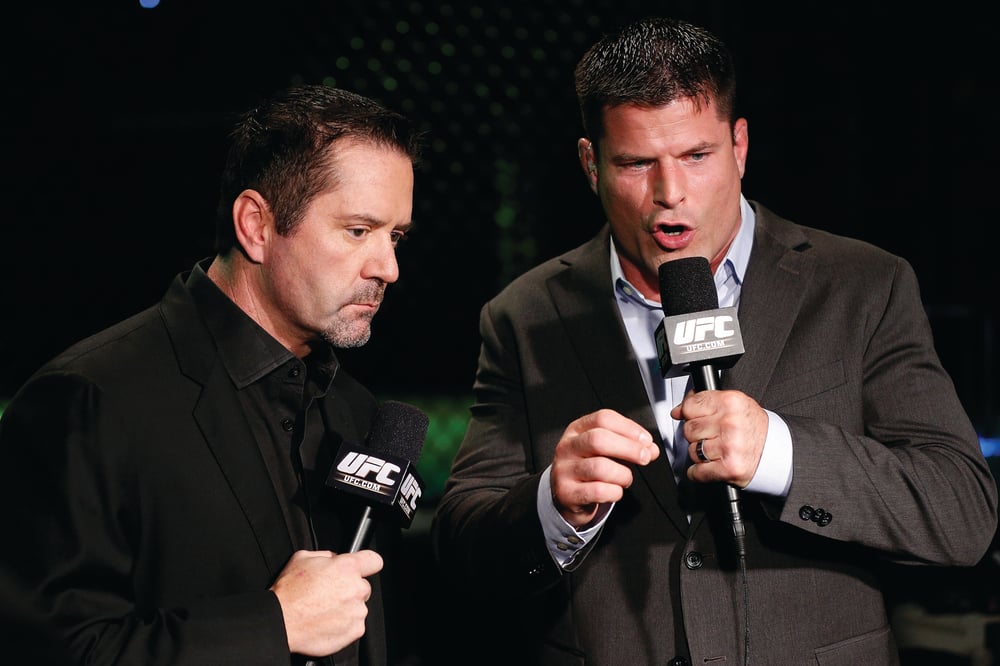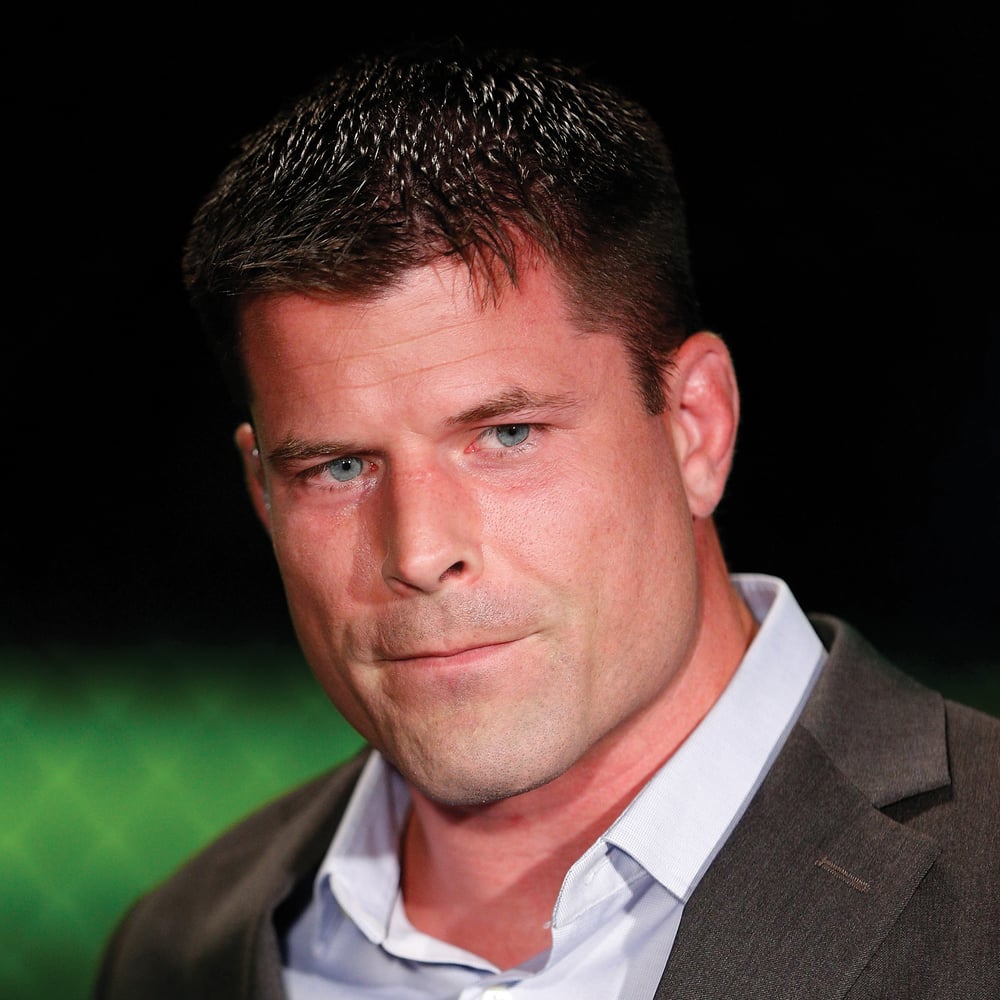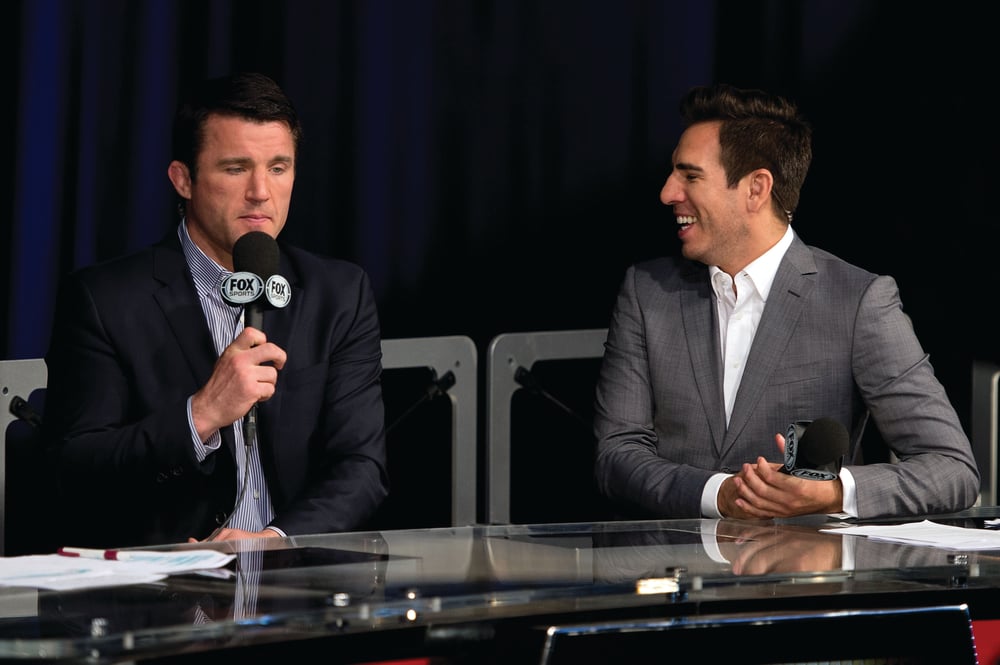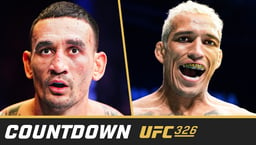
Issue 109
December 2013
Two of the UFC’s best-loved fighters transitioned into the role of TV analyst earlier this year, but how are they finding life as a cageside critic? FO tracks down Brian Stann and Kenny Florian to find out
UFC 163 is just seconds away from airing on pay-per-view. The now iconic Baba O’Riley pre-show montage is pulsating through the HSBC Arena in Rio de Janeiro, its volume rivaled by the thunderous roar of the raucous Brazilian crowd. At the side of the Octagon, Joe Rogan’s replacement for the night, Brian Stann, has but minutes left to gather his thoughts before he is live in millions of homes. As production members scramble around him, a cavalcade of thoughts and emotions flow freely through Stann’s head.
The tension is palpable and Stann would be forgiven for clutching the microphone with a clinched, sweaty fist in an effort to try and hide his anxiety. But instead – like a fighter in a gym – he is at ease with his surroundings. There’s no dryness in his palate, no awkward stance. The beads of sweat that are visible over his brow are not a product of nerves, rather they have formed as a result of the excessive heat from the spotlights directed at him.
It’s as if Stann has renounced fear. Years on the front lines, first as a Marine and then in a career as a prize fighter, have eradicated all nerves from his system. “It’s hard to get me nervous considering what I’ve been through,” Stann explains to FO.
“What was going through my head in those last few seconds was when I first started training in MMA, I bought all the DVDs I could to learn techniques. I remember thinking if I’d known back then I was going to call these fights someday, how crazy it would have sounded. It’s just one of those moments when you sit back afterwards and think how great it was.”
Just weeks later – again in Brazil, but this time in Belo Horizonte – the glare of the spotlight falls on Kenny Florian. Yet just like Stann, he is eerily calm, despite the intense pressure that comes with the role. When he was a fighter, Florian was able to flip the switch in the bowels of the arena before fights. In front of the camera, no such metamorphosis is necessary.
“It’s completely different to getting into the cage,” Florian reveals. “In a fight, you know what’s on the line. The stakes are higher. Doing TV, I feel comfortable out there.” Live television can make or break careers, but for these former fighters the transition to broadcasting has been seamless. Both have proven there is life after fighting and that change is good.
Despite different backgrounds, both fell into the game by chance and mastered the art in a short space of time. Florian has some prior experience having studied communications at Boston College, but Stann, a novice, quickly emerged as a true professional.
“Live TV is such a different animal to what you learn in college,” notes Florian. “It’s the same difference as between training in the gym and then entering the Octagon for real – they are in no way similar.” Thrust into the deep end when a Zuffa producer asked him to fill in for Joe Rogan at UFC 83, it was sink or swim. Yet Florian entered with an assured performance.
From there, he filled in at several WEC shows before becoming an analyst for ESPN’s MMA Live and later UFC Tonight. For Stann, a cancelation by another fighter opened the door for him, and he’s never looked back.
“For UFC on Fuel TV 1, whoever was supposed to do the weigh-in and post-fight show with Jay Glazer canceled,” he explains.” I did that show and immediately after, they asked me if I would be the guy for the Fox shows. It was just great timing for me and for the rest of the guys.”

Stann is now a staple of both the pre- and post-fight programming, while Florian is a co-host of UFC Tonight and color commentator for the Fox Sports 1 fight cards. They have fully settled into their new roles, but both find the process of critiquing fighters on live TV a tricky subject that requires some extra care.
As competitors, they knew all too well what it was like to face criticism, especially from their peers. Throughout their fighting careers, both admit they took the negatives on the chin as best they could, especially when it came from analysts such as Rogan. “I thought he was always fair to me,” says Florian.
“Nothing stands out for me that was completely wrong. He’s mostly dead on with what he says. Maybe there were some things here and there I disagreed with, but for the most part he was always pretty positive. I know criticism is something all fighters worry about, but at the end the day, you have to be able to brush it off.”
Stann echoes those sentiments, adding that there is a way to review a performance. “Coming from my military background, where people are pretty critical of each other, but not in a bad way, I am used to constructive criticism,” he explains. “So, when I was watching my peers break down my fights, they were right.
“They could see the things I did wrong, so I then knew what I needed to improve.”
However, now as the voices of the UFC during broadcasts, one bad word could alter a fighter’s career in the eyes of susceptible fans, something both are all too aware of. “Fighters are delicate with their confidence. That’s how they’re made,” says Stann. “Sometimes they ask me for my opinion and there’s a way of giving constructive criticism in a positive manner, so you are bestowing credit upon the other fighter. That’s important to me as I respect my peers and know how tough this job is. I talk to them and treat them the way I’d like to be treated.”

Florian believes that the current crop of fighters will respect the fact he is not some outsider who doesn’t understand the intricacies and mechanics of the fight game.
“Hopefully they appreciate that I’ve been in there,” he says. “I’ve done the same things and dealt with the same criticism.”
Ever since both men made the transition, they are watching a lot more fights in person. With that comes changing perceptions on MMA, most notably toward judging, fighter safety and refereeing. Both are now staunch advocates for further education. “We have a long way to go in regards to judging and refereeing. We need rules that are clearly defined for what winning a round truly means,” says Florian.
“As for referees, it’s tough when they reach the highest level, the UFC, but they need to be held accountable. If a referee messes up badly, they should be possibly fined or sent to take a course again.”
Stann goes a step further, calling for a centralized athletic commission, which carries out assessments. “For professional or college football, the referees in every conference are trained,” he says. “There should be a body that trains judges and referees because there are times when they see things that are so preposterous that they steal fights from guys who earned them.
“When you see a terrible call by a referee or a judge, that costs a guy a fight he clearly won, and you have to sum it up in 60 seconds, it’s brutal. You have to raise the point and call it down the middle. At times like that, my heart is broken for the guy. I believe he won the fight but now, he’s going to make less money and he has a loss on his record.”
“When you see a bad call, it hurts as I know how many hours of training and pain a fighter puts into winning,” adds Florian. “To see it taken away through a terrible decision is heartbreaking.”
Just like the fight game, both men are striving to improve their commentary and compare it with their fight careers. “I’m never satisfied with where my level is at,” explains Florian. “When you think you’re doing a great job, that’s when you screw up. I am constantly looking to improve.”
Stann – who received high praise for his work at UFC 163 – also refuses to rest on his laurels. He says: “You’re only as good as your last show, just as you are only as good as your last fight. It’s another one of those careers where one bad performance can cost you a long-term shot.”

ANALYZING FRIENDS AND FOES
Having trained alongside or even fought some of the men they now have to analyze live, staying objective is a difficult task for both Florian and Stann, such is their familiarity with some combatants.
“It’s tough,” says Florian. “I really try to stick to what is going on in the cage. I don’t have a bias. I’m watching the fight as an analyst trying to explain what’s happening. That’s my priority.
“I remember one of my first fights I did for the WEC. Mike Brown was taking on Urijah Faber at WEC 41 and Brown was a friend of mine, a guy I trained with. At the end of the fight, I remember people saying I was so biased against Brown. I just had to laugh, as Urijah was fighting with two broken hands.
“People needed to understand how difficult that was. He was throwing elbows, everything possible just to survive against Brown. Mike was winning the fight. That was clear, but there was another story that needed to be told and that’s what I did.”
Stann reiterates Florian’s words, adding that objectivity is always on his mind during broadcasts. He says: “Knowing the guys makes it very difficult, especially if they lose.” However, one thing Stann reveled in was getting to interview the winners post-fight inside the cage at UFC 163.
“It was so cool to be there for that guy’s moment and see the smile on their faces, that reward,” he explains. “These were people who fought their heart out, trained for months, and put it all on the line and won. I really enjoyed it.”
...









